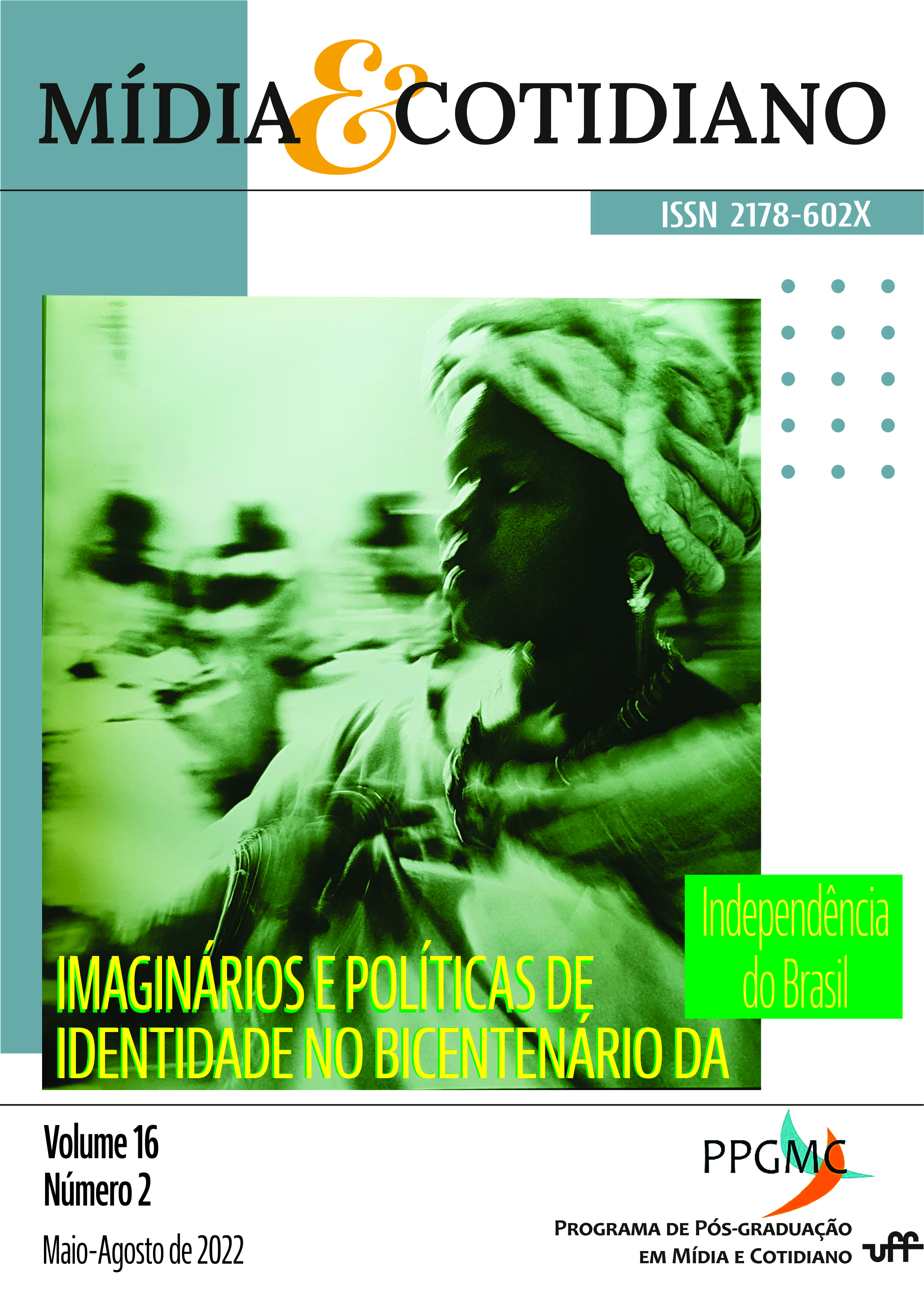Press and Radio on the Bicentennial of Independence: The Journalistic Discourse on Radio as an Educational and Cultural Media in a Pandemic Context in Bahia
DOI:
https://doi.org/10.22409/rmc.v16i2.53394Keywords:
Culture, history, radio, printed newspaper, Discourse AnalysisAbstract
The objective of the article is to develop a descriptive and analytical investigation of cases of use of radio as an educational media in the context of the current Covid-19 pandemic. Therefore, we analyzed the journalistic discourse in articles published by the main newspapers in the state of Bahia: O Correio da Bahia and A Tarde. We believe that it is essential to point out the importance of the written press and the radio in terms of history, memory and identities that these vehicles raise as they cross the Bicentennial of the Independence of Brazil, as a life experience of the Brazilian people, and, especially, of the Bahians. In the pandemic period, printed reports emerged of some experiences of using radio and, in this study, articles extracted from two newspapers in the Bahian capital are analyzed. They aroused relevant discussions about the discourses on the effective participation of the radio, in the cultural and social, political and economic imaginaries and identities of the population. The general objective of this study is to relate imaginaries and identities of the bicentennial of Independence with the emergence of the press in Brazil. Subsequently, discuss how this medium dialogues with the emergence and role of radio in Brazil, observing how the speeches that report educational actions with the use of radio are presented. Methodologically, discursive clippings are analyzed in journalistic articles that deal with the use or reinvention of radio in this pandemic period, from the perspective of a qualitative, descriptive and analytical approach. The research uses the instruments of French Discourse Analysis, based on studies that approach history, memory and citizenship.
Downloads
References
A TARDE. O rádio e a educação, a pandemia e a radiodifusão educativa na Bahia, Salvador, ano 109, nº 37.176, 05 fev. 2021.
CANCLINI, Néstor G. Culturas híbridas: Estratégias para entrar e sair da modernidade. São Paulo: Edusp, 2003.
CHARAUDEAU, Patrick. Discurso das Mídias. São Paulo: Contexto, 2006. 286p.
CORREIO. Ao pé do rádio: com internet limitada, alunos de cidade da Bahia sintonizam aula pela FM. Disponível em https://www.correio24horas.com.br/noticia/nid/ao-pe-do-radio-com-internet-limitada-alunos-de-cidade-da-bahia-sintonizam-aula-pela-fm/?utm_source=correio24h_share_whatsappt. Acesso em: 07 mar. 2021.
CORTINA, Adela. Cidadãos do mundo: uma teoria da cidadania. São Paulo: Edições Loyola, 2005.
CUCHE, Denys. A noção de cultura nas ciências sociais. Tradução: Vivian Ribeiro. 2ª ed. Bauru: EDUSC, 2002.
FERRARETTO, L. A. Rádio: o veículo, a história e a técnica. 3ª ed. Porto Alegre: Doravante, 2007.
FOUCAULT, Michel. A ordem do discurso: aula inaugural no College de France, pronunciada em 2 de dezembro de 1970. 4ª ed. São Paulo: Loyola, 1998. 79p.
MARTINS, Ana L.; LUCA, Tânia R. História da Imprensa no Brasil. São Paulo: Contexto, 2008.
MATTELART, Armand. Introdução aos Estudos Culturais. São Paulo: Parábola, 2004.
MUSSALIM, Fernanda. Análise do discurso. In: MUSSALIM, Fernanda; BENTES, Anna Cristina (org.). Introdução à linguística: domínios e fronteiras. Vol. 2. 8ª ed. São Paulo: Cortez, 2012. 321p.
NAVARRO, Pedro. O pesquisador da mídia: entre a “aventura do discurso” e os desafios do dispositivo de interpretação da AD. In: ______. Estudos do texto e do discurso: mapeando conceitos e métodos. São Carlos: Claraluz, 2006, p. 67-92.
ORLANDI, Eni. Interpretação. Petrópolis: Ed. Vozes, 1996. 157p.
ORLANDI, Eni. Análise do discurso: princípios e procedimentos. 6ª ed. Campinas: Pontes, 2005. 100p.
PANDOLFI, Fernanda C. O papel da imprensa na política no final do Primeiro Reinado: Uma análise do jornal Tribuno do Povo. História e Cultura, Franca, v.3, n.3 (Especial), p. 325-343, dez. 2014.
PÊCHEUX. Michel. O discurso: estrutura ou acontecimento? São Paulo: Pontes, 1990.
PÊCHEUX. Michel. Papel da memória. Tradução de José Horta Nunes. In: ACHARD, P. Papel da memória. Campinas: Pontes, 1999. 64p.
PRETTO, Nelson De Luca; TOSTA, Sandra de Fátima Pereira (org.). Do MEB à WEB: o rádio na educação. Belo Horizonte: Autêntica Editora, 2010. 208p.
URRY, Jonh. O Olhar do Turista: lazer e viagens nas sociedades contemporâneas. São Paulo: Studio Nobel/SESC, 2001. 231p.
Downloads
Published
How to Cite
Issue
Section
License
Aviso de Direito Autoral Creative Commons
1. Política para Periódicos de Acesso Livre
Autores que publicam nesta revista concordam com os seguintes termos:- Autores mantém os direitos autorais e concedem à revista o direito de primeira publicação, com o trabalho simultaneamente licenciado sob a Licença Creative Commons Attribution que permite o compartilhamento do trabalho com reconhecimento da autoria e publicação inicial nesta revista.
- Autores têm autorização para assumir contratos adicionais separadamente, para distribuição não-exclusiva da versão do trabalho publicada nesta revista (ex.: publicar em repositório institucional ou como capítulo de livro), com reconhecimento de autoria e publicação inicial nesta revista.
- Autores têm permissão e são estimulados a publicar e distribuir seu trabalho online (ex.: em repositórios institucionais ou na sua página pessoal) a qualquer ponto antes ou durante o processo editorial, já que isso pode gerar alterações produtivas, bem como aumentar o impacto e a citação do trabalho publicado (Veja O Efeito do Acesso Livre).


